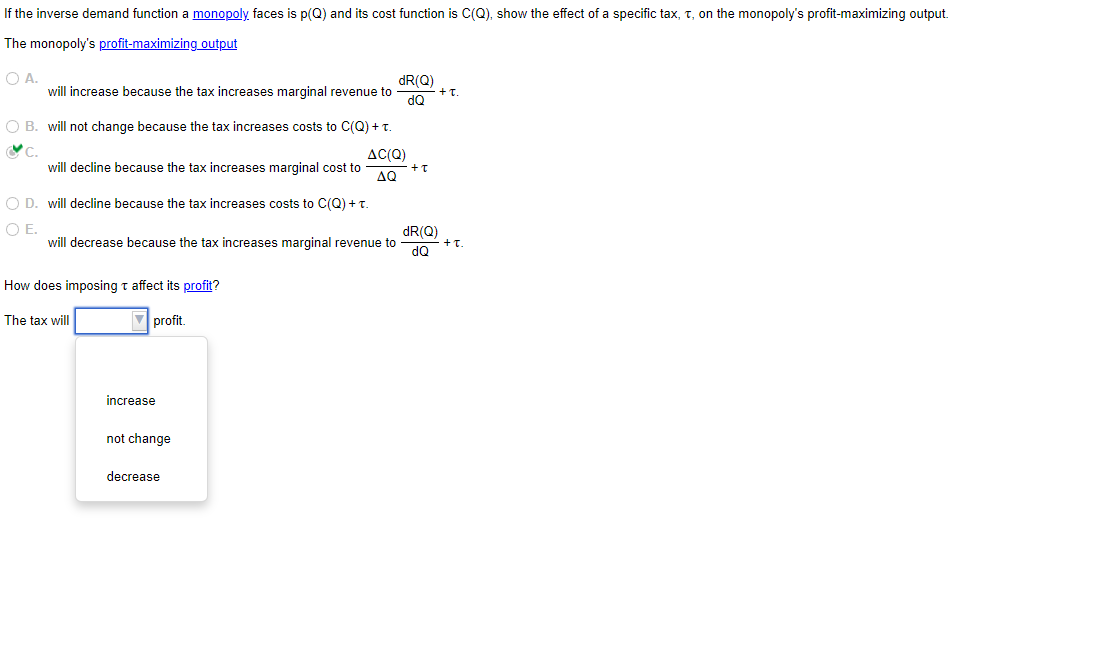If the inverse demand function a monopoly faces is p(Q) and its cost function is C(Q), show the effect of a specific tax, t, on the monopoly's profit-maximizing output. The monopoly's profit-maximizing output A. will increase because the tax increases marginal revenue to OB. will not change because the tax increases costs to C(Q) + T. C. will decline because the tax increases marginal cost to AC(Q) AQ O D. will decline because the tax increases costs to C(Q) + T. O E. How does imposing t affect its profit? The tax will profit. dR(Q) will decrease because the tax increases marginal revenue to dQ increase dR(Q) dQ not change decrease + t + T. + T.
If the inverse demand function a monopoly faces is p(Q) and its cost function is C(Q), show the effect of a specific tax, t, on the monopoly's profit-maximizing output. The monopoly's profit-maximizing output A. will increase because the tax increases marginal revenue to OB. will not change because the tax increases costs to C(Q) + T. C. will decline because the tax increases marginal cost to AC(Q) AQ O D. will decline because the tax increases costs to C(Q) + T. O E. How does imposing t affect its profit? The tax will profit. dR(Q) will decrease because the tax increases marginal revenue to dQ increase dR(Q) dQ not change decrease + t + T. + T.
Managerial Economics: Applications, Strategies and Tactics (MindTap Course List)
14th Edition
ISBN:9781305506381
Author:James R. McGuigan, R. Charles Moyer, Frederick H.deB. Harris
Publisher:James R. McGuigan, R. Charles Moyer, Frederick H.deB. Harris
Chapter11: Price And Output Determination: Monopoly And Dominant Firms
Section: Chapter Questions
Problem 4E
Related questions
Question
V2

Transcribed Image Text:If the inverse demand function a monopoly faces is p(Q) and its cost function is C(Q), show the effect of a specific tax, t, on the monopoly's profit-maximizing output.
The monopoly's profit-maximizing output
O A.
will increase because the tax increases marginal revenue to
O B. will not change because the tax increases costs to C(Q) + T.
C.
will decline because the tax increases marginal cost to
O D. will decline because the tax increases costs to C(Q) + T.
O E.
will decrease because the tax increases marginal revenue to
How does imposing t affect its profit?
The tax will
▼profit.
increase
not change
AC(Q)
AQ
decrease
dR(Q)
dQ
+ t
dR(Q)
dQ
+I.
+T.
Expert Solution
This question has been solved!
Explore an expertly crafted, step-by-step solution for a thorough understanding of key concepts.
Step by step
Solved in 3 steps with 1 images

Knowledge Booster
Learn more about
Need a deep-dive on the concept behind this application? Look no further. Learn more about this topic, economics and related others by exploring similar questions and additional content below.Recommended textbooks for you

Managerial Economics: Applications, Strategies an…
Economics
ISBN:
9781305506381
Author:
James R. McGuigan, R. Charles Moyer, Frederick H.deB. Harris
Publisher:
Cengage Learning



Managerial Economics: Applications, Strategies an…
Economics
ISBN:
9781305506381
Author:
James R. McGuigan, R. Charles Moyer, Frederick H.deB. Harris
Publisher:
Cengage Learning





Economics (MindTap Course List)
Economics
ISBN:
9781337617383
Author:
Roger A. Arnold
Publisher:
Cengage Learning